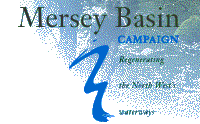Abstract
The European Union Water Framework Directive (WFD) offers an unparalleled
opportunity for improving river basin management, whilst moving towards
a sustainable future. Sustainable management of water requires integrated
planning, recognising interconnections between systems operating at different
levels of scale. This is an endeavour in which systems thinking could provide
useful tools. Systems orientated models can facilitate work across levels
of scale, enhance dialogue, and improve perception of the 'whole picture'.
This research examined the emerging role of active participation in 'planning
for sustainability' in the context of river catchments. The DesignWays process,
developed by the author, was tested in the context of regeneration in the
Mersey Basin of NorthWest England. The development of DesignWays was a conscious
attempt to embed 'new paradigm' living systems metaphors into a participatory
protocol for ecologically informed design.
The research tested DesignWays at the landscape and site levels of scale,
using an action-based, interpretive methodology. Challenges posed by the
WFD were identified, from which criteria were developed for assessing this
approach. Interviews were conducted with participants before and after the
process, providing data about changes in understanding resulting from their
experience. Interviews with key decision makers in the NorthWest were used
to test and develop the findings.
This research had two major outcomes: a contribution to theory through an
in-depth exploration of the theoretical basis of participatory, ecologically
informed design, as exemplified by the DesignWays approach; and a contribution
to practice through investigating its potential to meet key challenges of
the WFD. This research points to the importance of understanding participatory
planning as a societal process, aiming to make the process engaging and
meaningful. It explored the value of integrating participatory planning
and education for sustainability. It demonstrated the benefits of an iterative
process in which planning at the landscape level of scale informs, and is
informed by, work at the site level. It has shown that an approach consistent
with a living systems paradigm can contribute to the development of more
integrated, ecologically sound solutions. |
|
Reference for this
work:
Tippett, J. (2004).
A participatory protocol for ecologically informed design within river
catchments. School of Planning and Landscape. Manchester, University of
Manchester: unpublished Ph.D. thesis, 537 pgs., www.holocene.net/research/phd.htm
Related work
Masters
Research into the Mersey Basin Campaign
Report from Action Research with the Irk Valley Project
|

